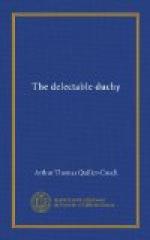“This Willie Pinsent was a comely boy, too: handsome as old Key, an’ quick at his books. He’d a bold masterful way, bein’ proud as ever his mother was, an’ well knowin’ there wasn’ his match in Tregarrick for head-work. Such a beautiful hand he wrote! When he was barely turned sixteen they gave ‘en a place in Gregory’s Bank—Wilkins an’ Gregory it was in those aged times. He still lived home wi’ his mother, rentin’ a room extra out of his earnin’s, and turnin’ one of the bedrooms into a parlour. That’s the very room you’re lookin’ at. And when any father in Tregarrick had a bone to pick with his sons, he’d advise ’em to take example by young Pinsent—’so clever and good, too, there was no tellin’ what he mightn’t come to in time.’
“Well-a-well, to cut it short, the lad was too clever. It came out, after, that he’d took to bettin’ his employers’ money agen the rich men up at the Royal Exchange. An’ the upshot was that one evenin’, while he was drinkin’ tea with his mother in his lovin’ light-hearted way, in walks a brace o’ constables, an’ says, ’William Pinsent, young chap, I arrest thee upon a charge o’ counterfeitin’ old Gregory’s handwritin’, which is a hangin’ matter!’
“An’ now, sir, comes the cur’ous part o’ the tale; for, if you’ll believe me, this poor woman wouldn’ listen to it—wouldn’ hear a word o’t. ‘What! my son Willie,’ she flames, hot as Lucifer—’my son Willie a forger! My boy, that I’ve missed, an’ reared up, an’ studied, markin’ all his pretty takin’ ways since he learn’d to crawl! Gentlemen,’ she says, standin’ up an’ facin’ ’em down, ’what mother knows her son, if not I? I give you my word it’s all a mistake.’
“Ay, an’ she would have it no other. While her son was waitin’ his trial in jail, she walked the streets with her head high, scornin’ the folk as she passed. Not a soul dared to speak pity; an’ one afternoon, when old Gregory hissel’ met her and began to mumble that ’he trusted,’ an’ ‘he had little doubt,’ an’ ’nobody would be gladder than he if it proved to be a mistake,’ she held her skirt aside an’ went by with a look that turned ’en to dirt, as he said. ‘Gad!’ said he, ’she couldn’ ha’ looked at me worse if I’d been a tab!’ meanin’ to say ‘instead o’ the richest man in Tregarrick.’
“But her greatest freak was seen when th’ Assizes came. Sir, she wouldn’ even go to the trial. She disdained it. An’ when, that mornin’, the judges had driven by her window, same as they drove to-day, what d’ee think she did?
“She began to lay the cloth up in the parlour yonder, an’ there set out the rarest meal, ready for her boy. There was meats, roasted chickens, an’ a tongue, an’ a great ham. There was cheese-cakes that she made after a little secret of her own; an’ a bowl of junket, an inch deep in cream, that bein’ his pet dish; an’ all kind o’ knick-knacks, wi’ grapes an’ peaches, an’ apricots, an’ decanters o’ wine, white an’ red. Ay, sir, there was




